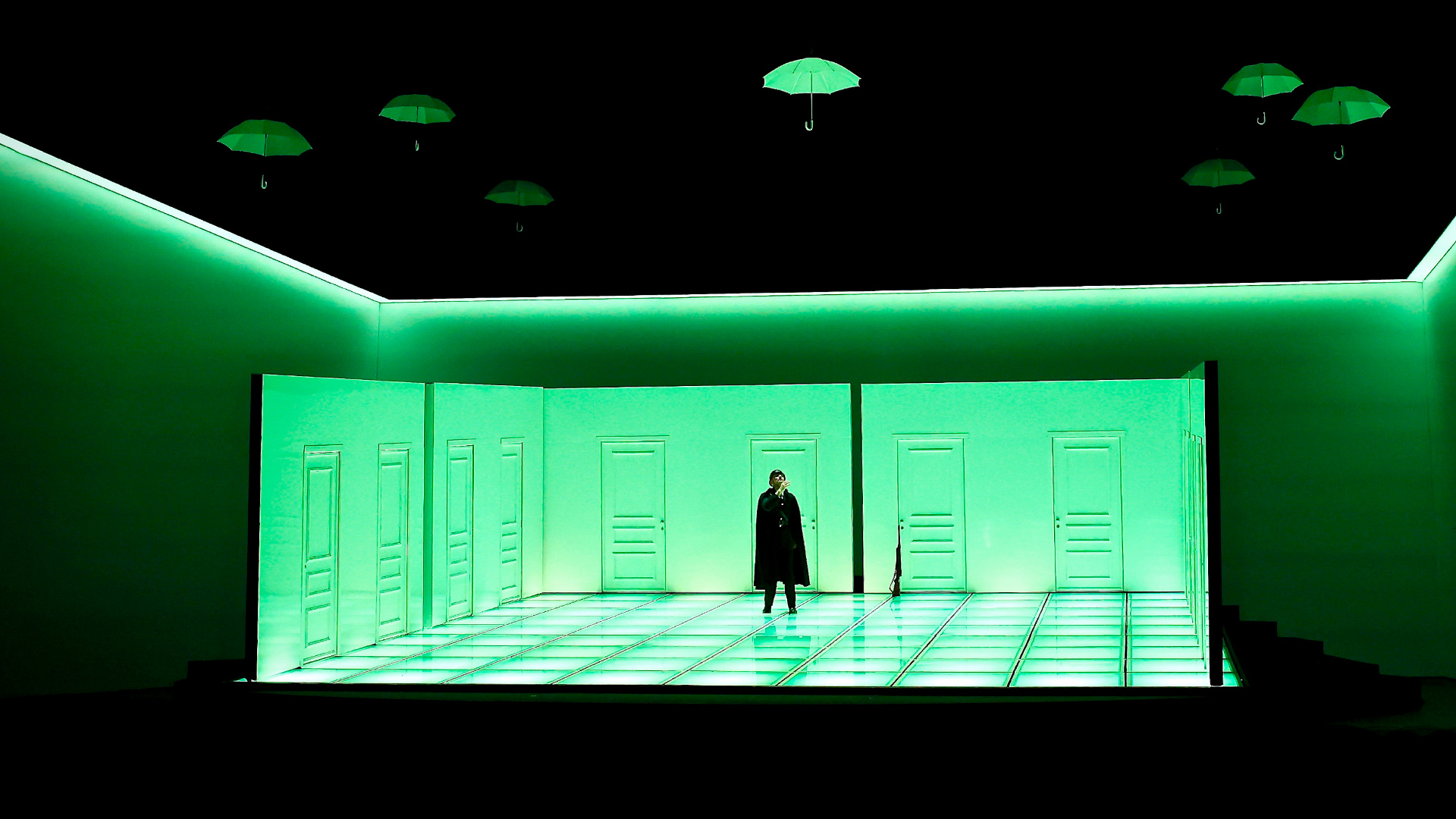Musical farce in four acts by Nino Rota, libretto by himself and Ernesta Rinaldi from the play Un chapeau de paille d’Italie by Eugène Labiche and Marc Michel
New version of the staging by the Fondazione Teatro Carlo Felice di Genova in collaboration with the Opéra Royal de Wallonie-Liège
Characters and interpreters:
Fadinard
Marco Ciaponi
Nonancourt
Nicola Ulivieri
Beaupertuis/Emilio
Paolo Bordogna
Uncle Vezinet
Didier Pieri
Felice
Gianluca Moro
Achilles of Rosalba/One guard
Blagoj Nacoski
A corporal of the guards
Franco Rios Castro
Elena
Benedetta Torre
Anaide
Giulia Bolcato
The milliner
Marika Colasanto
The Baroness of Champigny
Sonia Ganassi
Minardi
Federico Mazzucco
Concertmaster and conductor
Giampaolo Bisanti
Director
Damiano Michieletto
Scenes
Paolo Fantin
Costumes
Silvia Aymonino
Lighting
Luciano Novelli
Orchestra, Chorus and Technicians of the Opera Carlo Felice Genova
Choirmaster Claudio Marino Moretti
Stage Director
Luciano Novelli
Stage musical director
Simone Ori
Hall Masters
Sirio Restani, Antonella Poli
Stage Masters
Andrea Gastaldo, Anna Maria Pascarella
other Choir Master
Patrizia Priarone
Lighting Master
Luca Salin
Master of supertitles
Simone Giusto
Assistant director
Paola Ornati
Music archive manager
Simone Brizio
Stage director
Alessandro Pastorino
Deputy stage manager
Sumireko Inui
Console Handling Manager
Andrea Musenich
Engineer foreman
Gianni Cois
Foreman electricians/lighting booth
Marco Gerli
Tooling foreman
Tiziano Baradel
Head of audio/video department
Walter Ivaldi
Head of tailoring, shoemaking, make-up and wigs
Elena Pirino
Make-up and hair co-ordinator
Raul Ivaldi
Scenes and props
Fondazione Teatro Carlo Felice
Costumes
Low Costume-Sartoria Nori-Tirelli
Footwear
Pompei
Wigs
Mario Audello
Supertitles by
Enrica Apparuti
Opera in brief
by Ludovica Gelpi
Nino Rota is often associated with the many highly successful soundtracks he composed between the 1930s-when just 22 years old he composed the music for Raffaello Matarazzo’s Treno popolare -and the 1970s. Among the best known are those he made for Federico Fellini such as 8½, Giulietta degli spiriti and Amarcord, or for Francis Ford Coppola (The Godfather part I and part II). However, his catalog also hosts a large number of compositions ranging from piano music to chamber music and again to symphonic music and eleven titles of musical theater – Il cappello di paglia di Firenze is among the latter the most successful.
The year was 1945 and in an Italy ravaged by war Rota had his compositional career underway. In the operatic field he had already produced three works, Il principe porcaro (composed when he was only thirteen in 1925, performed posthumously in 2003), Ariodante (1942) and Torquemada (1943). Compared to the recent Ariodante and Torquemada, the composer wanted with Il cappello realize something new, both thematically by exploring the buffo genre and by expanding his compositional language. Together with his mother Ernesta Rinaldi, an author and musician, Rota then worked on adapting the 1851 play Un chapeau de paille d’Italie by Eugène Labiche and Marc Michel into an opera libretto. It was a farsain five acts that was particularly fitting as a subject for an operatic transposition, already having in it many of the typical aspectsinarrative of the eighteenth-nineteenth-century opera buffa, starting with the characters: two young newlyweds in love, a father-in-law who is both laboring and opposed to their union, an unlikely pair of clandestine lovers, a jealous husband, a deaf uncle, and so on. An expedient as simple and bizarre as the need to find a straw hat from Florence becomes the ideal starting point for creating endless comic possibilities and increasingly hilarious situations. In the Rota-Rinaldi adaptation the division is into four acts, but except for a few minor changes the plot is faithful to Labiche and Michel’s original.
Rhythm is a central element, a key dramaturgical and musical point. From the beginning of the narrative, the brilliant character of the opera becomes clear, the first act already proceeds briskly, Fadinard tells Uncle Vézinet about the hat incident, Anaide and Emilio arrive, then Elena and Nonancourt, and the daring “hunt for the hat” of theprotagonist begins. The second act becomes denser with an early part in the cheerful milliner’s store and then the rowdy, farcical visit to the baroness’s palace. The third act, even more absurd, takes place at the home of the first disconsolate and then wrathful Beaupertuis ending with the whirling comings and goings in the square of the last act. And it is precisely in the play’s rhythm that its comic heart is to be found, in the continuous and increasingly frantic pulsation, in Fadinard’s gradually crazier tenacity, in the obstinacy of the wedding procession that blindly follows the protagonist, generating havoc everywhere. The rhythm of the drama is perfectly matched by that of the musical discourse, in which Rota flaunts a very rich range of disfumature. This is writing that is deeply tied to tradition on a technical level, exclusively tonal and far from the research that saw many contemporaries engaged around new compositional techniques. The “traditional premise” here is the work of the eighteenth and nineteenth centuries, which Rota reinterprets and reinterprets with a bright new look, also drawing on his experience in film. In particular, the almost stereotypical characterization of the characters is exploited by the composer to create a joyful and ironic fresco of opera history, quoting through the different characters various styles from Mozart to Rossini to Donizetti.
The first performance of Il cappello di paglia di Firenze was held on April 21, 1955, ten years after it was composed. The warm reception aroused a lot of curiosity around the opera, which was also soon revived by such illustrious directors as Giorgio Strehler and Pierluigi Pizzi, becoming one of the composer’s most beloved titles and a unique example of twentieth-century opera buffa.



